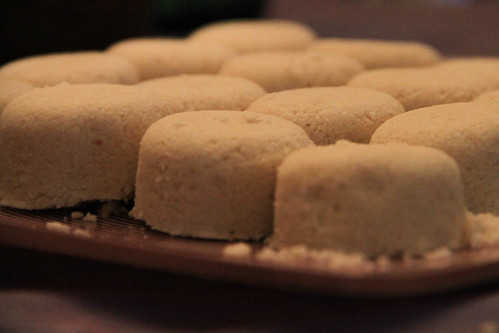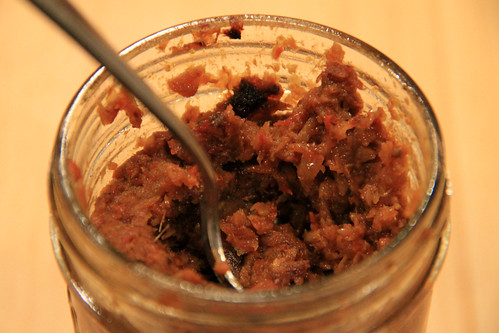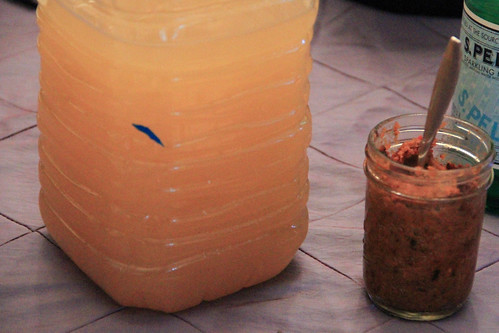This little slice of West Africa, internationally infamous for its brutal civil war and more recent Ebola crisis, has an unique origin story: it was founded by freed slaves who returned from the US. (Note: A Liberian comments that this is the wrong way to portray it. To clarify I should say that the nation in its current political form was founded by those free slaves; indeed there were many people living there prior.) From what I can tell most of the cuisine is based on the locally available foods — which, unlike most of the rest of Africa but similarly to its immediate neighbors, is based on rice as a staple — but there are hints of the American legacy, particularly in the desserts.

Thanks to Jeff, Mark, and Heather, all folks who've worked in Liberia, for advice that translated directly into my choice of dishes. (Sorry none of you could make it!) And to Mama Pauline's, the African market that's a short bike ride away, for having everything I needed and plenty of friendly advice!

This was our first-ever meal where we didn't know any of the guests, and it was a great success! We met an astrophysicist, a Portland Police detective, and a caterer from Hood River, among other fascinating characters. Thanks to Jia, Daniel, Katie, Mary, Dave, Courtney, Emily, Brynden, Bonni, and Geo for coming, and for donating generously!
Kanyah | Peanut snack | Recipe

A really simple treat made from just peanuts, rice, and sugar. To avoid turning it into peanut butter, I crushed the peanuts by hand in my big mortar and pestle, which was easy enough. (You could use a Ziploc and a rolling pin to similar effect.) But crushing toasted rice grains by hand was getting mighty tedious, so I just threw them into the food processor. The resulting mix of the three ingredients is like slightly wet sand and hence quite crumbly; I used a measuring cup to create the forms. It’s reminiscent of halva or those other crumbly sweets from the heart of the Near East.
Palm butter | Recipe and some advice
 The rich sauce extracted from palm nuts can be found all along the coast of West Africa, and it’s typically prepared in the same way, as a stew. When we’ve cooked this dish for other countries, it has one type of meat, if any at all. But Liberians seem to revel in tossing in whatever treasures of land and sea they manage to come across, hence why the recipe calls for [[CRAB??]], shrimp, chicken, beef, and smoked turkey. (Of course if you don’t have them all on hand, just use what you’ve got!) Given that these palms are native to this part of the continent, it’s little wonder that this is considered a very important dish, one that a woman is traditionally expected to be able to make before she’s considered marriageable.
The rich sauce extracted from palm nuts can be found all along the coast of West Africa, and it’s typically prepared in the same way, as a stew. When we’ve cooked this dish for other countries, it has one type of meat, if any at all. But Liberians seem to revel in tossing in whatever treasures of land and sea they manage to come across, hence why the recipe calls for [[CRAB??]], shrimp, chicken, beef, and smoked turkey. (Of course if you don’t have them all on hand, just use what you’ve got!) Given that these palms are native to this part of the continent, it’s little wonder that this is considered a very important dish, one that a woman is traditionally expected to be able to make before she’s considered marriageable.
I messed up in one big way. As the name implies, this dish is supposed to be cooked down until it’s thick and rich. But I started with a bunch of water to boil the meats, and then added more to thin the palm sauce, and even after an hour and a half of boiling it was too thin. Alas, it was time to eat, so we ended up with more of a soup. It was definitely tasty (though I found the shrimp to be quite overcooked — my preference would have been to add them at the very end!), but if you’re going to make this, make sure to err on the side of less water as you can always add more. Alas, doesn’t look like I’m quite cut out to be a Liberian housewife yet.
Sweet potato greens | Recipe
Add these to the list of foods I’m surprised we don’t see more often in American markets. They’re tasty, nutritious, easy to cook, and we’re already producing them everywhere we grow sweet potatoes. (My guess is they’re being fed to pigs.) Fortunately, Mama Pauline’s had them frozen in a big lump imported from Cameroon, and they cooked up quite like frozen spinach would. As with the palm butter, it’s a stew with a jumble of meats, though with a fresher and less heavy flavor. This was the clear crowd favorite!
Check rice | Recipe

I couldn’t figure out where the name comes from, does anyone know? The special ingredient is jute, which is known as molokhiya in the Arab world, an astonishingly mucilaginous green that until now I’d only encountered as a really goopy soup. Fortunately I find it goes a lot better when mixed in judicious quantities with rice.
Speaking of rice, it’s the main grain of this corner of Africa, and is typically made these days from the parboiled (aka converted) variety. Despite the bad rap that Uncle Ben gets for his converted rice, it turns out to actually be healthier than plain white rice, because the parboiling process forces vitamins from the germ into the heart of the grain.
Hot fried pepper | Recipe

If the intense spice of the peppers doesn't get you, then the pungency of the smoked fish will! Be sure to open the windows and turn on the vent when preparing and frying up this intense condiment, which brings an unmistakably West African flavor to the table. I scaled down the recipe by 2/3 and still had way too much left over!
Pineapple beer | Recipe

“Beer” is a misnomer, as there’s no yeast or brewing or alcohol involved. But it wouldn’t be right to call it “juice” either, since instead this is more of an extract made by boiling pineapple and leaving it to sit overnight, then straining the solids from the flavored water. I’m not quite sure why this is considered a better technique than simply juicing a pineapple and adding a weak simple syrup, it’s certainly more labor-intensive! But I guess you can do it with nothing more specialized than a knife and a strainer (or a substitute like an old, clean t-shirt), rather than something to press juice with.
Ricebread | Recipe

While much of Liberian food is quite similar to that of the surrounding countries, one distinctive aspect is a tradition of baking that returned feed slaves brought back from the US. This recipe’s understated name leaves out an important part, it’s full of plantains along with broken rice. It’s rich and hearty, though not too sweet, a nice gluten-free breakfast option that we happened to eat for dessert.
